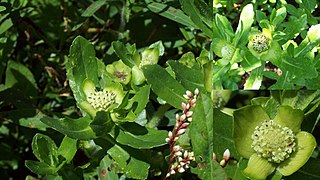
Coreopsis is a genus of flowering plants in the family Asteraceae. Common names include calliopsis and tickseed, a name shared with various other plants.

Monstera is a genus of 59 species of flowering plants in the arum family, Araceae, native to tropical regions of the Americas.

Banksia integrifolia, commonly known as the coast banksia, is a species of tree that grows along the east coast of Australia. One of the most widely distributed Banksia species, it occurs between Victoria and Central Queensland in a broad range of habitats, from coastal dunes to mountains. It is highly variable in form, but is most often encountered as a tree up to 25 metres (82 ft) in height. Its leaves have dark green upper surfaces and white undersides, a contrast that can be striking on windy days.

Pavonia is a genus of flowering plants in the mallow family, Malvaceae. The generic name honours Spanish botanist José Antonio Pavón Jiménez (1754–1844), as chosen by his contemporary, Spanish botanist Antonio José Cavanilles. Several species are known as swampmallows.

Vitex is a genus of flowering plants in the sage family Lamiaceae. It has about 250 species. Common names include chaste tree or chastetree, traditionally referring to V. agnus-castus, but often applied to other species, as well.

The taxonomy of Banksia integrifolia has a long and complex history, the result of confusion caused by the species' great variability, and similarities with some closely related species. The existence of hybrids between B. integrifolia and related species as well as early attempts to classify the species based on dried specimen material have also contributed to the confusion.

Banksia integrifolia subsp. integrifolia is a subspecies of Banksia integrifolia.

Banksia integrifolia subsp. compar is a subspecies of Banksia integrifolia. It has larger, glossier leaves than other subspecies, and occurs much further north.

Chloroleucon is a genus of flowering plants in the family Fabaceae. Some authorities consider it part of the genus Albizia. Its name is derived from the Greek words χλωρóς (chloros), meaning "green," and λευκός (leukos), meaning "white."

Enydra is a genus of flowering plants in the Asteraceae, or daisy, family. They are native to the Asian, African and American Tropics and Sub-Tropics.

Chiococca is a genus of flowering plants in the family Rubiaceae. It currently holds 23 species that are native to Florida, Texas, Mexico, Central America, much of South America, the West Indies, and the islands of Galápagos and Fernando de Noronha.

Seringia integrifolia is a shrub of the family Malvaceae native to inland Australia in New South Wales, South Australia, Western Australia, Queensland, and the Northern Territory.
Chlamydocardia is a genus of flowering plants belonging to the family Acanthaceae.
Dintera is a monotypic genus of flowering plants belonging to the family Plantaginaceae. It contains just one species, Dintera pterocaulisStapf, which comes from Namibia.
Hochreutinera is a genus of flowering plants belonging to the family Malvaceae.

Hodgkinsonia is a monotypic genus of flowering plants belonging to the family Rubiaceae. It only contains one species, Hodgkinsonia ovatifloraF.Muell.
Howelliella is a monotypic genus of flowering plants belonging to the family Plantaginaceae. It only contains one species, Howelliella ovata.
Maguireocharis is a monotypic genus of flowering plants belonging to the family Rubiaceae. It only contains one known species, Maguireocharis neblinaeSteyerm.

Hennecartia is a monotypic genus of flowering plants belonging to the family Monimiaceae. The only species is Hennecartia omphalandra.

Bouchetia is a genus of flowering plants belonging to the family Solanaceae. Its native range is subtropical America and it is found in the countries of Argentina, Brazil, Guatemala, Mexico, Paraguay, Uruguay and the United States (Texas).












